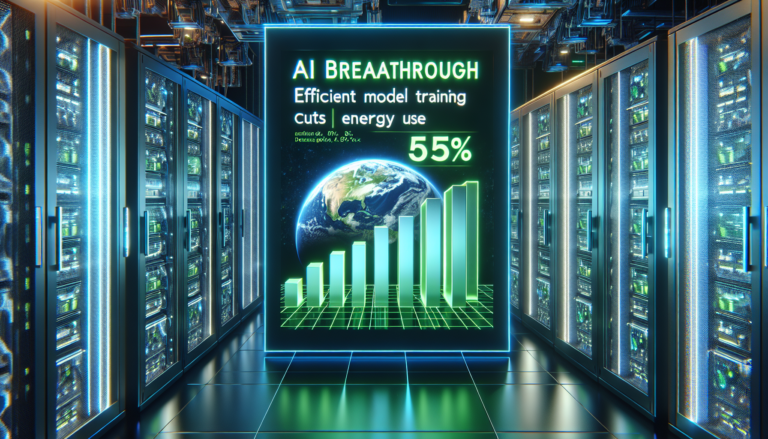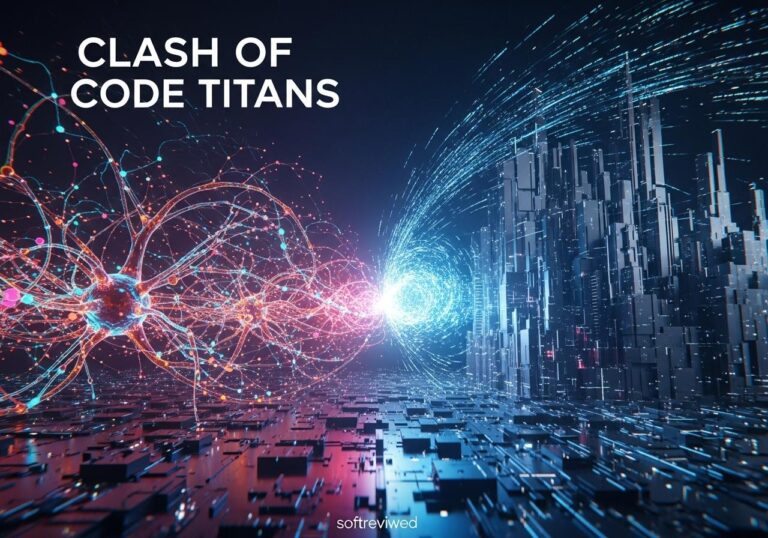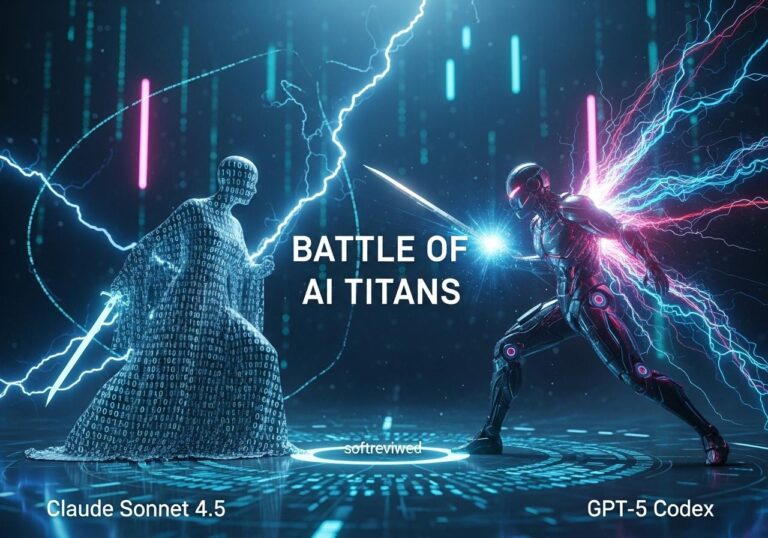Google’s AI Breakthrough: Efficient Training
Google’s DeepMind revolutionizes AI training with energy-efficient and faster methods.
Efficient Model Training
Google achieves a remarkable 55% reduction in energy consumption through innovative and efficient model training methods.
Multimodal Contrasting Learning
Google’s DeepMind introduces JEST (Joint Example Selection) for multimodal contrasting learning, enhancing AI training efficiency.
13 Times Faster Training
JEST accelerates AI training by an impressive 13 times compared to existing methods, revolutionizing the field.
Enhanced Learning with Quality Data
JEST emphasizes the importance of quality data in AI model training, leading to more effective learning outcomes.
Reduced Environmental Impact
Efficient AI training methods contribute to a lower environmental footprint by significantly reducing energy consumption.
Google has unveiled a groundbreaking advancement in artificial intelligence that promises to revolutionize the way we train AI models. This innovative approach not only significantly reduces energy consumption but also accelerates the training process, paving the way for more sustainable and accessible AI development. Let's explore the implications of this remarkable achievement and its potential impact on the tech industry and beyond.
The Power of Efficient AI Training
Google's latest breakthrough in AI model training is turning heads in the tech world, and for good reason. By optimizing the training process, they've managed to achieve two critical improvements:
- A staggering 55% reduction in energy consumption
- A twofold increase in training speed
These advancements are set to reshape the landscape of AI development, making it more environmentally friendly and cost-effective.
Slashing Energy Consumption
The most impressive aspect of Google's innovation is its ability to cut energy use by more than half. This reduction in power consumption has far-reaching implications:
- Environmental Benefits: Lower energy usage translates to a smaller carbon footprint for AI development.
- Cost Savings: Reduced energy consumption means lower operational costs for data centers and cloud computing services.
- Sustainability: This breakthrough aligns with global efforts to create more sustainable technologies.
Accelerating Model Training
In addition to energy savings, Google's new approach doubles the speed of model training. This acceleration offers several advantages:
- Faster Development: AI researchers and developers can iterate and improve models more quickly.
- Increased Productivity: Less time spent on training means more time for innovation and problem-solving.
- Competitive Edge: Companies can bring AI-powered products and services to market faster.
Implications for the AI Industry
The ripple effects of Google's breakthrough are likely to be felt across the entire AI ecosystem. Let's examine some of the key areas that stand to benefit:
Cloud Computing Services
Cloud providers offering AI and machine learning services can expect significant improvements in their operations:
- Reduced costs for maintaining and cooling data centers
- Ability to offer more competitive pricing for AI services
- Increased capacity to handle larger and more complex AI workloads
AI Research and Development
The research community will find new opportunities opening up:
- Ability to work with larger, more sophisticated AI models
- Faster experimentation and iteration cycles
- Potential for breakthroughs in areas previously limited by computational constraints
Startups and Small Businesses
Smaller players in the AI field may find the playing field leveling:
- Lower barriers to entry for AI development
- Increased ability to compete with larger, resource-rich companies
- More opportunities for innovation and specialization
Technical Insights: How It Works
While the full details of Google's breakthrough are yet to be revealed, we can speculate on some of the techniques that might be involved:
Optimized Hardware Utilization
- Improved algorithms for distributing workloads across GPUs and TPUs
- Better memory management to reduce data transfer bottlenecks
Advanced Software Optimization
- Refined training algorithms that converge faster
- Smarter data preprocessing and augmentation techniques
Energy-Efficient Model Architectures
- Novel neural network designs that require less computation
- Pruning and compression techniques to reduce model size without sacrificing performance
Industry Reactions and Expert Opinions

The announcement has sparked excitement and discussion among AI experts and industry leaders:
"This breakthrough has the potential to not only reduce the environmental impact of AI, but also to democratize access to AI systems for researchers and organizations worldwide." — Andrew Ng, AI pioneer
This sentiment highlights the dual benefits of environmental sustainability and increased accessibility that Google's innovation brings to the table.
"The increased efficiency in AI model training can greatly benefit cloud computing services and data centers, leading to significant cost savings." — Mark Russinovich, Microsoft Azure Chief Technology Officer
Russinovich's comment underscores the potential economic impact of this breakthrough, particularly in the cloud computing sector.
Challenges and Considerations
Despite the overwhelmingly positive reception, there are some challenges and considerations to keep in mind:
Intellectual Property and Competition
- Potential patent disputes may arise as competitors seek to develop similar technologies
- The need for industry-wide standards to ensure fair competition and interoperability
Ethical and Security Concerns
- As AI models become more powerful and efficient, ensuring their responsible use becomes increasingly important
- Enhanced security measures may be necessary to protect these advanced AI systems from misuse or attacks
Workforce Implications
- The increased efficiency in AI development could lead to changes in workforce requirements
- Upskilling and reskilling programs may be necessary to adapt to new technologies and methodologies
Future Prospects and Research Directions
Google's breakthrough opens up exciting possibilities for future research and development in AI:
Expanded AI Applications
- More efficient training could enable AI to tackle previously unfeasible problems
- Potential for breakthroughs in fields such as healthcare, climate modeling, and scientific research
Green AI Initiatives
- This innovation may spark a trend towards more environmentally conscious AI development
- Potential for industry-wide efforts to reduce the carbon footprint of AI technologies
Interdisciplinary Collaborations
- Opportunities for collaborations between AI researchers and experts in fields like energy efficiency and sustainable computing
Practical Implications for Businesses and Developers
For those working directly with AI technologies, Google's breakthrough offers several practical benefits:
Cost Reduction
- Lower energy consumption translates to reduced operational costs for AI projects
- Potential for more cost-effective cloud-based AI services
Faster Time-to-Market
- Accelerated training times allow for quicker development and deployment of AI-powered products
- Increased ability to iterate and improve AI models in response to market feedback
Scalability
- The ability to work with larger, more complex models opens up new possibilities for AI applications
- Improved efficiency may allow for the deployment of sophisticated AI on a wider range of devices
Getting Started with Efficient AI Training
While Google's specific implementation may not be immediately available, there are steps developers and organizations can take to improve the efficiency of their AI training processes: This includes optimizing data pipelines, utilizing scalable hardware infrastructure, and leveraging pre-trained models when appropriate to reduce the overall training time and resource consumption. Additionally, implementing advanced tools such as an AI audio detector with 97.4% accuracy can streamline tasks like speech recognition or sound classification, further enhancing the system’s performance. By focusing on efficiency at each stage, developers can significantly reduce costs and improve the scalability of AI solutions.
- Optimize Data Preprocessing: Efficient data handling can significantly reduce training time and energy consumption.
- Leverage Transfer Learning: Using pre-trained models as a starting point can speed up development for specific applications.
- Explore Model Compression: Techniques like pruning and quantization can reduce model size and computational requirements.
- Utilize Cloud Resources Wisely: Take advantage of cloud providers' optimized AI training services and best practices.
- Stay Informed: Keep up with the latest research and developments in efficient AI training techniques.
The Road Ahead: A More Sustainable AI Future
Google's breakthrough in efficient AI model training marks a significant milestone in the journey towards more sustainable and accessible artificial intelligence. As the technology continues to evolve, we can expect to see:
- Increased focus on energy-efficient AI across the industry
- More affordable and accessible AI development tools and services
- Accelerated innovation in AI applications across various sectors
The implications of this advancement extend far beyond just Google or the tech industry. It represents a step towards a future where powerful AI technologies can be developed and deployed with minimal environmental impact, opening up new possibilities for solving complex global challenges.
As we move forward, it will be crucial for researchers, developers, and policymakers to work together to ensure that these advancements are used responsibly and for the benefit of society as a whole. The journey towards more efficient and sustainable AI has only just begun, and the possibilities are truly exciting.
By staying informed and embracing these new technologies, businesses and individuals can position themselves at the forefront of this AI revolution, ready to harness its power for innovation, growth, and positive change.







